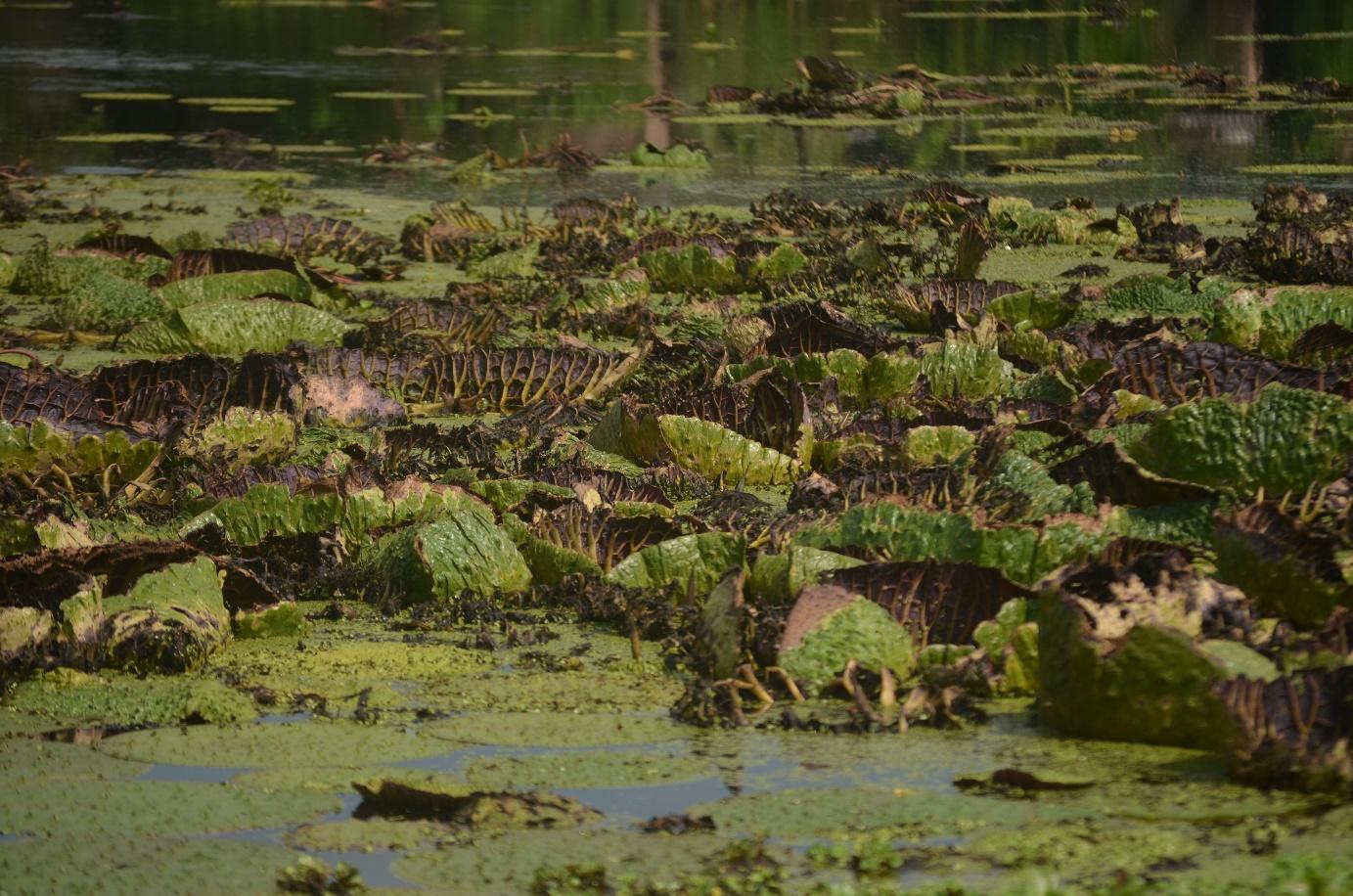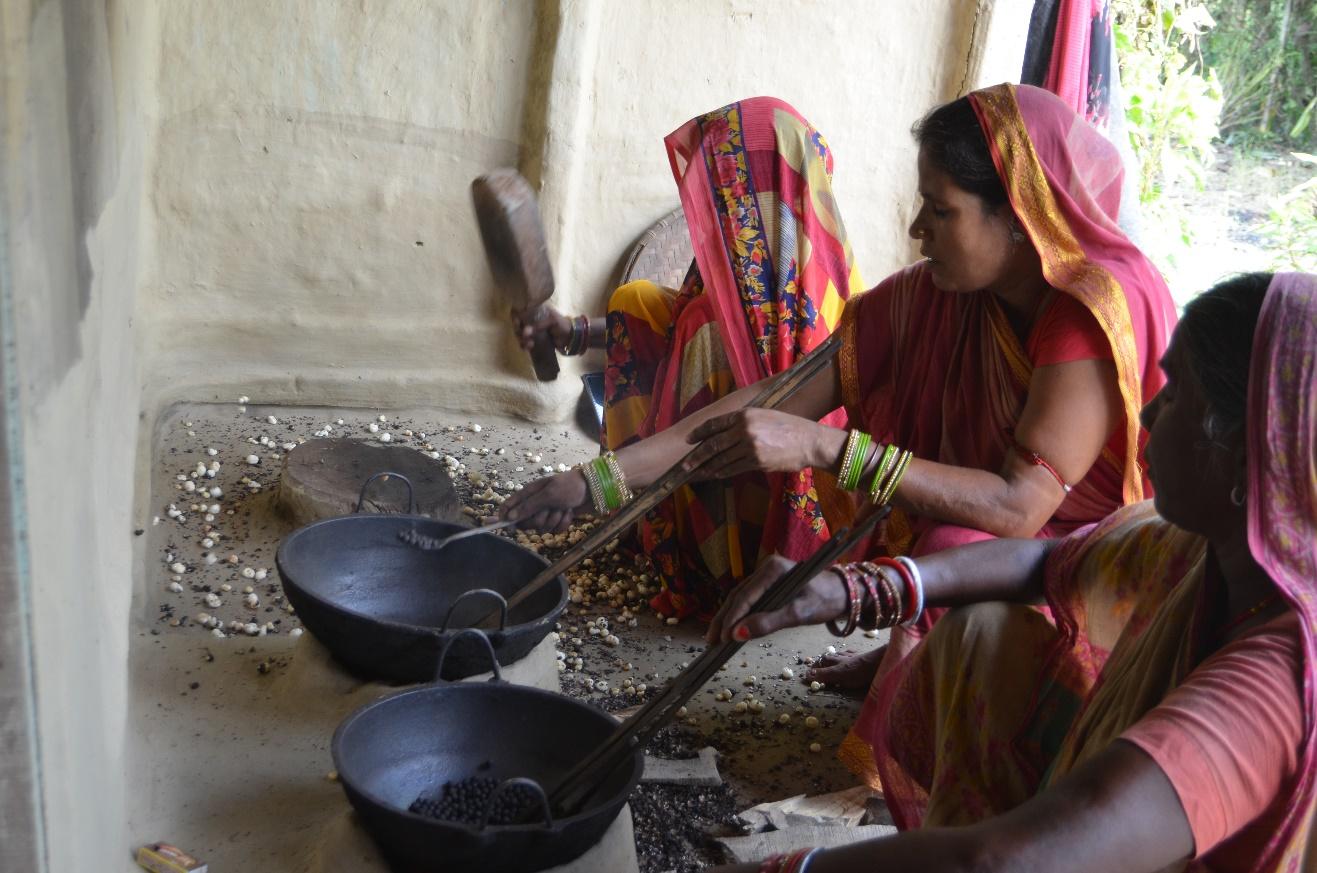The context
The Mallah community of Usrar village is historically engaged in fisheries in the many village ponds and wetlands of Madhubani district, in the Mithila region of Bihar. The majority of the Mallah community are landless or hold very small plots, and derive much of their food needs by sharecropping plots belonging to landlords, a process known locally as bataiya . As with many marginalised communities in the Mithila region, chronic food insecurity and rising demands for cash in a market economy mean that migrant labour is increasing, with many men residing in urban centres of Bihar, Delhi and West Bengal while the women cultivate the land. However, fisheries remain an important source of cash income.
Ponds are generally leased from the local government or wealthier farmers. To strengthen this livelihood activity, implementing partner Sakhi Bihar were instrumental in establishing fisheries collectives in the 1990s, whereby groups of rural women would lease and stock the village ponds for fisheries as a group, sharing labour, profits and expenditure. As well as fisheries, makhana production has been another traditional occupation of the Mallah caste, and is a niche product from the Mithila region. Makhana is the seed of the prickly water lily plant, and when ‘popped’ through roasting (much like popcorn) it is a highly nutritious health food with a robust market value in urban areas.
Map: Location of Usrar village

However, in recent years, frequent flooding, high labour requirements and lack of interest amongst the younger generation in a migration driven economy, mean that cultivation of makhana seeds and processing has declined significantly, and now the trade is becoming dominated by wealthier farmers and businesspeople in neighbouring districts.
Under the Swashakt programme, women’s collectives established by the Sakhi Bihar in a consortium led by the University of Birmingham seek to revive makhana production as an enterprise amongst the Mallah and other interested communities in Usrar and nearby Bhagwatipur village. The Usrar group is the first to initiate production. Most of the group had abandoned Makhana production 7-8 years ago. While some of the group have small plots of land, most are landless sharecroppers, and most of the male household members have migrated to Delhi, Kolkata and other urban centres for work. Production is being revived initially through supporting the processing of Makhana seed purchased from the market. As the enterprise takes root, the collective will invest in seed production as well as in the ponds they lease. They will select ponds less vulnerable to flooding.
Makhana collective production cycle
Throughout the production cycle, makhana production is highly labour intensive – and therefore it is ideally suited for a collective enterprise, whereby labour is pooled within the group. Many tasks need to be carried out in synchrony, and division of labour is necessary within the group. Labour hours, cash investments and profits are all shared equitably within the group.
Stage 1: Cultivation of makhana seeds
Makhana seeds are cultivated from the prickly water lily plant (euryale ferox). It is planted initially in nurseries in December, and transplanted in January. The seeds are harvested in two stages in the month of July and August. The seeds are found at the bottom of the pond, after dropping from the buds on the stalks of the plant, and harvesting it is labour intensive and requires specialist skills. At present only 2 ponds in Usrar are being used for makhana seed processing, but from the next production cycle in December 2021, the consortium hopes to support the collective to cultivate seeds. The seeds can also be harvested from lilies planted in submerged fields, and this is another option that will be considered. Seed production alone is profitable. One large pond owner in a nearby village had invested Rs90,000 in input costs (around £900) (including labour), to earn an income of 110,000 (almost £1100)

Stage 2: Drying the makhana
The makhana seeds are spread out and dried for a minimum of 4 hours in the sun. During the first cycle, the seeds have been purchased, but there have been issues with the quality, meaning the production of seeds by the collective itself will commence from the winter of 2021/22. At present many fo the village ponds are being used only for fisheries.

Stage 3: Grading
The makhana seeds are graded by size using a large sieve, known as a chalna. Different sizes of seeds yield makhana that are sold for different prices when the processing is over.

Stage 4: Roasting and popping
This is the most critical stage of the production process. Using several chulos, or wood burning stoves, the makhana is roasted while being stirred continuously. At the same time the hot makhana is passed over to a second team who pop the makhana seeds by pounding it with a pitna, or hammer and board (afra). This is a labour intensive process, and generally four to five people will roast, while another two to three people pop the makhana. It is at this stage that the benefits of collective labour come to the fore, as an individual household would not be able to process makhana on their own.

Stage 5: Cleaning and sorting
The makhana pop is sorted from the waste by-product. An additional second stage can be to clean the makhana to make it white and remove the residue of the husk or remaining particles. This requires a machine, and can add 10-20% to the value of the product. Sakhi is piloting the use of a machine to complete this task.

Stage 6: Marketing
Makhana pop can then be sold in the local market. It is potentially highly profitable, and can be sold for up to Rs2000 (around £20) per kg. As the enterprise matures, the collective will be packaging the makhana pop to add value to it. Makhana pop has a long shelf life and is lightweight and easy to transport. As a highly nutritious health food it has a good market across urban India and overseas.

Looking forward
The initial establishment of the Makhana processing enterprise has been successful in reviving a traditional product of the Mithila region, as well as an indigenous occupation of the Mallah community, ensuring that the relevant knowledge and skills continue to be transferred between the generations. A first priority for the next production cycle, starting in winter, will be for production of the seeds to be revived, so the collectives do not need to depend on purchasing seeds on the open market. Some of these seeds are produced commercially in Purnea in submerged paddy fields, and the quality is often poor. Expertise is being offered by the Makhana research centre to support the collectives in the months ahead to enhance the quality of their product at all stages of the production cycle.